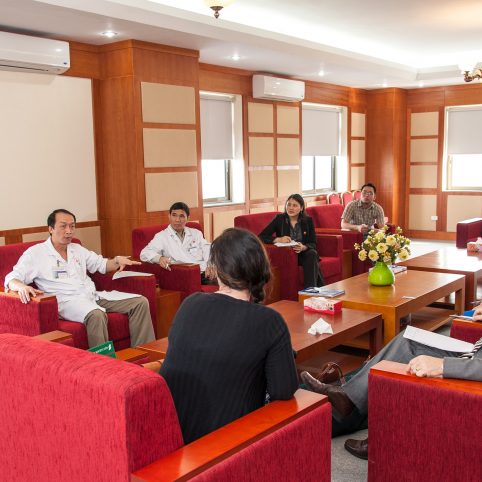The World Federation of Hemophilia (WFH) established a twinning programme over two decades ago. There are two types of twinning:
Treatment Centre Twinning
This is where an established haemophilia treatment centre partners with an emerging haemophilia treatment centre to help improve diagnosis and medical care for people with haemophilia.
Organisation Twinning
This is where an established national member organisation partners with an emerging organisation to share knowledge in areas such as patient education, outreach, fundraising, publications and all other aspects of operating a successful haemophilia patient organisation.
Twinning aims to improve haemophilia care in emerging countries through a formal agreement and two-way partnership between two haemophilia organisations or treatment centres for a period of four years. The WFH provides annual grants to twins of between 2,000 USD and 8,000 USD.
There are many benefits to a twinning partnership. Twinning builds capacity through the transfer of skills and knowledge, leading to more capable organisations that are able to provide improved haemophilia services. Twinning also encourages collaboration, builds strong relationships among haemophilia organisations and treatment centres.
The Irish Haemophilia Society has twinned with many countries over the years including Greece, Hungary, Bosnia & Herzegovina, Vietnam and most recently Jordan. The World Federation of Hemophilia twinning programme aims to improve and sustain care for people with inherited bleeding disorders around the world.
The work with our twinned organisation in Jordan – the Jordan Thalassemia and Haemophilia Society – has so far focused on governance issues, publications and communications, events and membership and strategic planning.
There were visits to Jordan in 2019 and in 2020 we have continued our work together, albeit online due to the pandemic.
Over the coming years, we will also provide training in advocacy and lobbying and work to double the number of members in their organisation in addition to identifying potential new board members and volunteers.
The comprehensive care centres at St. James’s and Crumlin have also twinned with their counterparts in Jordan. Their work will include working on a better national registry, national treatment protocols and training of members of the comprehensive care team. We will work jointly with the centres on the development of a national procurement system for factor concentrates or other haemophilia medications in Jordan.
